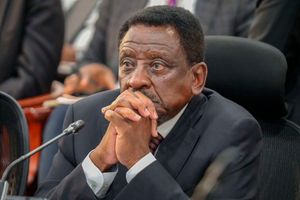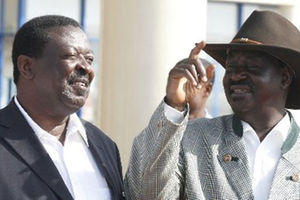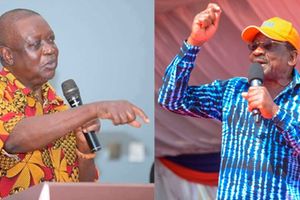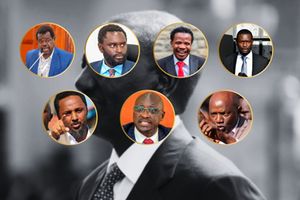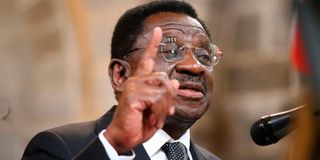
Siaya County Governor James Orengo.
James Orengo is uneasy with the ongoing political dalliance between Raila Odinga’s Orange Democratic Movement (ODM) and President William Ruto’s United Democratic Alliance (UDA). If there are others sharing the same discomfort within ODM, they have adopted silence as a weapon.
Orengo built his career on principled opposition, often positioning himself against the status quo. His discomfort with the unfolding rapprochement is not merely ideological; it is anchored in a long history of resistance politics and a deep scepticism towards elite consensus that lacks grassroots legitimacy. His decision to challenge Odingaism —the dominant political culture within ODM and a survival strategy for many politicians in Raila’s stronghold — suggests a reckoning with unfinished political business. Orengo is no Johnny-come-lately; he is a seasoned actor whose political instincts have been shaped by decades of struggle and dissent.
After President Daniel Moi attempted to coax Jaramogi Oginga Odinga into political cooperation, but this effort was cut short by Jaramogi’s death, it was Orengo who rubbished the entire arrangement by accusing President Moi of mischief.
Directing his words at President Moi, who was in attendance, Orengo declared: “Woe unto you hypocrites! Yes, I say again, woe unto you hypocrites, who tortured and detained this great man, and now come here in false praise of his greatness. For many vilified him, abused him, scorned him, called him senile, called him blind, and now, for the past fortnight since Jaramogi died, have sung his praises, expressing false grief.”
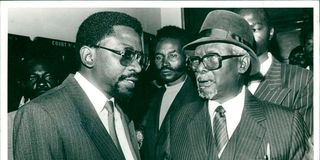
James Orengo and Jaramogi Oginga Odinga at the High Court in Nairobi on July 18, 1991.
President Moi—who had once dismissed Jaramogi as “blind”—was visibly displeased as Orengo twisted the knife deeper: “Hypocrites are forever the swine of human civilization. The Pharisees and high priests of Kenya’s politics are men without principle and without vision.”
Orengo knows when to attack and he has had a long history. In the early months of 1974, a political firebrand barely out of his teens rattled the very foundations of the University of Nairobi. At just 22, James Orengo—then Secretary of the Kenya Students Union—launched a bold and uncompromising campaign that would place him at the epicenter of a showdown between students and the establishment.
In the 1974 incident, Orengo was seeking to decolonise the academic space and felt that Prof F. Jorgenson, the head of the Department of Architecture, was deliberately failing black students. After a mass failure in the department, Orengo issued an ultimatum: that unless Jorgenson was removed from his post, the students would down their tools and stage a university-wide strike.
In February, tensions reached boiling point during a dramatic showdown at the Great Court between Orengo and the Vice-Chancellor, Dr. Josephat Njuguna Karanja.
“You are here because we are here!” Orengo declared defiantly.
“I am here because I am here!” Dr. Karanja retorted.
With no solution, the university was hit by riots — Prof Jorgenson’s car was burnt —and Dr Karanja responded by shutting down the institution. However, the pressure ultimately forced Prof Jorgenson to resign—a symbolic and strategic victory for Orengo and his fellow students.
Ever since his election in 1980 as Kenya’s youngest Member of Parliament, James Orengo—now the Governor of Siaya County—has built a reputation as a resolute dissenter and firebrand, unafraid to challenge authority and speak truth to power. A fierce advocate for democratic ideals and civil liberties, Orengo quickly emerged as a thorn in the side of the ruling elite.
In 1982, amid President Daniel arap Moi’s escalating crackdown on political opposition, James Orengo was forced into exile as the regime intensified its pursuit of so-called "dissidents." At the centre of this repression was Constitutional Affairs Minister Charles Njonjo, who had grown increasingly intolerant of criticism. By then, Orengo was among a group of outspoken MPs pejoratively dubbed the “seven bearded sisters” by Njonjo—a phrase meant to mock and belittle their radical critiques of the government.
Yet Orengo remained undeterred. In one particularly memorable exchange in Parliament, as Njonjo entered the chamber in his signature pinstripe suit and flowered lapel, Orengo quipped from the floor: “I almost thought I was seeing the Queen’s butler walking into the House!” The cutting remark drew laughter and showcased Orengo’s fearless brand of political theatre—irreverent, unbowed, and always ready to puncture the self-importance of the powerful.
The payback came swiftly. A few weeks later, Orengo was arrested and charged with forgery, uttering false cheques, and stealing clients’ money. Immigration officials also seized his passport, along with those of Wundanyi MP Mwashengu wa Mwachofi, Kitutu East MP Abuya Abuya, and Kilifi South MP Chibule wa Tsuma. The idea was to contain them in Kenya at a time when Yoweri Museveni was fighting in Uganda to topple the Obote regime.
Many viewed the charges as politically motivated, and Orengo, convinced he would not receive a fair trial, fled to Tanzania. There, he joined Chelagat Mutai, another firebrand politician who had gone into exile in October 1981 after being accused of making false mileage claims totaling Sh69,000.
In a 2011 interview transcript housed at the US Library of Congress, Orengo recounted the trajectory of his exile: “I went to Uganda and was out there for a month. Then I went to Tanzania and stayed some time. I went to Zimbabwe... When I came back to Tanzania, I wanted to do a post-graduate [degree] at the University of Dar es Salaam. And there had been a coup attempt in Tanzania... but because the coup plotters in Tanzania ran to Kenya, Kenya now found a basis for trying to talk with the Tanzanian government to exchange the exiles. And that’s what happened to me: we were exchanged and I was brought [to Nairobi] where I was detained for six months in 1983.”
By then Njonjo had also fallen out of favour and was fighting to survive.
More than 40 years later, Orengo is still challenging the status quo—only now, his target appears to be Raila Odinga’s brand of politics, as both men grapple with age, time, and the shifting political landscape. At the core of Orengo’s mission is a personal bid to dismantle Odingaism as an organising category of politics within the Lake Victoria region. It is not Orengo’s first such attack. As a presidential hopeful in 2002 on a Social Democratic Party (SDP) ticket, Orengo finished fourth with just 0.4 per cent of the votes. Certainly, Orengo had overestimated himself and burnt his political fingers badly. Humbled, he retreated and chose survival—playing ball with Raila, the undisputed gatekeeper of Odingaism, a political creed deeply intertwined with loyalty, legacy, and, currently, the towering presence of Raila Odinga.
Those who watched Orengo recalibrate himself and repositioned himself as one of Raila’s most loyal lieutenants. Many wondered whether any Lake region politician would challenge Raila and survive. This tactical retreat allowed him to survive and eventually thrive, rising to become a Senator, a key legal strategist in Raila’s corner, and now the Governor of Siaya—a political bastion of Odingaism itself.
Orengo may have had designs on eclipsing Raila, but the former prime minister notes in his autobiography that it was he who, during a 1980 by-election, convinced his father—then Vice President Jaramogi Oginga Odinga—to back the 29-year-old Orengo for the Ugenya parliamentary seat. That endorsement didn’t come easy. Jaramogi had to sideline his preferred candidate, James Maura Okeyo, a commerce graduate from the University of Delhi, whom he eventually persuaded to step aside—paving the way for Orengo’s entry into national politics despite fierce competition.
The dramatic standoff is thanks to the broad-based government arrangement between Raila and Ruto and which brought key ODM luminaries to key positions within the government. But unlike the days when he was a student at the University of Nairobi, Orengo, though now a seasoned political operator and legal luminary, might find the terrain far more personal and politically treacherous. He has been both a beneficiary and a prisoner of Raila’s political orbit.
The two men—bonded by history, struggled, and a shared belief in reformist politics. They also stood side by side through some of Kenya’s most turbulent political chapters risking life and pushing Kenya to near frontiers of democracy. Yet beneath that enduring alliance, a quiet tension has always simmered: a supremacy contest that Orengo understood well. He deferred his personal ambitions, choosing instead to align them carefully within the contours of the Raila doctrine. Has the time to entangle himself arrived?
Indeed, James Orengo stands out as a rare constant in Kenya’s turbulent political evolution. Of all the firebrands who rose in the 1970s and 1980s, he remains one of the few still active on the political podium, his voice as resolute as ever. In 1990, he boldly took the government to court after the Registrar of Societies, Joseph King’arui, rejected an application by Jaramogi Oginga Odinga to register the National Democratic Party. Around the same time, Orengo was instrumental in conceptualising the Forum for the Restoration of Democracy (FORD), working behind the scenes with the assistance of some officials from the US Embassy. His defiance came to a head on November 19, 1991, when, atop a pick-up truck at Kamukunji grounds, Orengo, alongside Masinde Muliro, Philip Gachoka, and Martin Shikuku, attempted to address a crowd. They were arrested at the edge of the stadium—but by then, the democratic tide had already begun to turn.
Of course, Orengo has his challenges – as a politician, and as former Cabinet minister and as a governor. But whatever Jimmy is up to is worth watching.
Kamau is a PhD candidate in History, University of Toronto, Canada. Email: [email protected]; On X: johnkamau1

